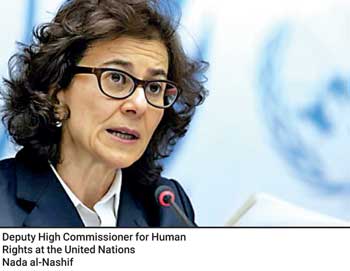Thursday Feb 19, 2026
Thursday Feb 19, 2026
Tuesday, 12 September 2023 01:18 - - {{hitsCtrl.values.hits}}
 The Deputy High Commissioner for Human Rights at the United Nations Nada al-Nashif yesterday emphasised that the Office of the United Nations High Commissioner for Human Rights (OHCHR) has consistently advocated for an impartial international inquiry into the 2019 Easter Sunday terror attacks in Sri Lanka.
The Deputy High Commissioner for Human Rights at the United Nations Nada al-Nashif yesterday emphasised that the Office of the United Nations High Commissioner for Human Rights (OHCHR) has consistently advocated for an impartial international inquiry into the 2019 Easter Sunday terror attacks in Sri Lanka.
During the first meeting of the 54th Regular Session of the Human Rights Council in Geneva, the Deputy High Commissioner of Human Rights presented an oral report on Sri Lanka. In her statement, she disclosed that the High Commissioner of Human Rights has consistently urged the Government of Sri Lanka to conduct a comprehensive follow-up investigation into the series of bombings. Furthermore, she emphasised the importance of this investigation being independent, transparent, and inclusive, with international support and active involvement of the victims and their representatives.
“Truth-seeking alone is not sufficient, and must be accompanied by clear commitment to accountability,” she said.
Emphasising the pivotal role of accountability in safeguarding Sri Lanka’s present and future, Al-Nashif underscored the significance of the accountability project, the council, and its member states in advancing accountability within the nation. She reiterated her office’s unwavering commitment to fostering reconciliation and accountability in Sri Lanka.
Addressing Sri Lanka’s recent economic crisis, Al-Nashif expressed regret that the anticipated transformation to address longstanding issues had not yet materialised, despite one year having passed since the anti-government protests.
“The country continues to deal with the aftermath of the deep economic crises of 2022, and the current stresses in the global economy”, she said, emphasising that the crisis affected the poor and marginalised community the most, doubling the island’s poverty rates from 13% in 2021 to 25% in 2022.
In light of this, she called upon the international community, including international financial institutions, to maintain their support for Sri Lanka’s economic recovery by offering the necessary fiscal flexibility while also advocating for substantial advancements in governance, transparency, and accountability.